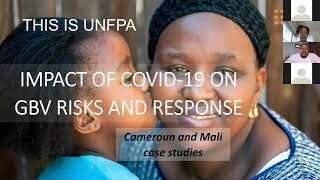Dakar, 9 July 2020 - The United Nations Population Fund (UNFPA) Regional Office for West and Central Africa held a virtual conference on Wednesday 08 July 2020 on the impact of COVID-19 on Gender-Based Violence in West and Central Africa. The webinar focused on two country case studies, namely Cameroon and Mali.
In each of the two countries, the evidence presented suggested that there was an increase in Gender-Based Violence (GBV) during the period of the coronavirus (COVID-19) pandemic, as countries applied restrictive measures to curb the spread of the virus.
In his introductory remarks, UNFPA Regional Director for West and Central Africa Mabingue Ngom said that, “GBV and gender rapid assessments conducted in West and Central Africa showed strong correlation between COVID-19 and the increased socio-economic vulnerability of women and girls, especially in societies with weak and informal economies.”
Presenting findings from a GBV Information Management System in Mali, UNFPA Country Representative Dr. Eugene Kongnyuy reported that there was a 35% increase in GBV, with 484 cases reported in April 2020 compared to 317 in April 2019. He noted that these data were collected from 13 partners (2020), as opposed to 32 service providers of the same period in 2019.
The UNFPA Mali Representative noted that all those interviewed see undeniable links between COVID-19 and the trend of worsening gender-based violence. The disruption of income-generating activities and essential services, including the closure of schools, exposed women and girls to sexual exploitation and rape.
In Cameroon, UNFPA Cameroon Representative Mrs. Siti Batoul Oussein, indicated that 62% of survey respondents noticed changes in GBV trends since the outbreak of the COVID-19, with the main GBV risks being domestic violence and sex for survival. Some 96% believed that their communities would be afraid to go to health centers in the event of increased rates of infection with this disease; Meanwhile, 55% of respondents lamented the lack of post-rape kits in their health facilities.
These trends are added to an already critical humanitarian situation due in particular to armed conflicts in the South-West, North-West and Far North Regions of Cameroon. Majority of the respondent service providers did not receive any training or orientation on GBV, Child Marriage, Caring for child survivors and GBV data collection in the last three months.
The two Representatives shared some initiatives they are carrying out on the ground. This is the case of the "One-Stop Center" which allows victims of GBV to benefit from psychological support in addition to socio-economic assistance in Mali. In Cameroon, the integration of GBV, family planning, adolescents and young people and mental health has been systematized in the overall package for sexual and reproductive health. Both presented some recommendations including the integration of COVID-19 into the humanitarian response, the pre-positioning of post-rape kits, community mobilization, advocacy and more resource mobilization to meet the ever-increasing needs.
The webinar also saw the participation of UN Women Mali Representative Mrs. Beatrice Eyong, two partner organisations from Cameroon and Mali, as well as seventy-five other participants.
UNFPA Regional Director Mr. Mabingué Ngom appealed for a continuation of the fight against the scourge that constitute GBV. "the fight against GBV must continue and be strengthened more than ever," he noted.
The final reports of the findings will be published later.
Note to the editor:
A UNFPA global study, with contributions from Avenir Health, Johns Hopkins University (USA) and Victoria University (Australia) estimates that the COVID-19 pandemic is likely to cause a one-third reduction in progress towards ending all forms of gender-based violence, including intimate partner violence, sexual violence, child marriage and female genital mutilations by 2030. For every three months that the lockdown continues, they expect 15 million additional cases of gender-based violence.
In the UNFPA Global Plan to deal with the COVID-19 pandemic, the agency focuses on three priority areas:
- Ensure continuity of sexual and reproductive health services and interventions, including the protection of health personnel;
- End gender-based violence;
- Ensure the supply of modern contraceptives and other reproductive health products
By gender-based violence, UNFPA refers to the definition of the Beijing Platform for Action, which refers to all forms of violence that strike women, girls, but also men and boys. victims, due to the unequal power relationship between them and the perpetrators. Women and girls are mainly victims of gender-based violence because of the social norms that legitimize and support men's power over women.
Contact : Habibou Dia| Media Specialist, UNFPA WCARO | dia@unfpa.org | Tel: +221 78 620 45 13


